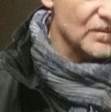Fabrizio Ulivieri's Blog, page 24
January 9, 2025
Il canto degli angeli - figure angeliche
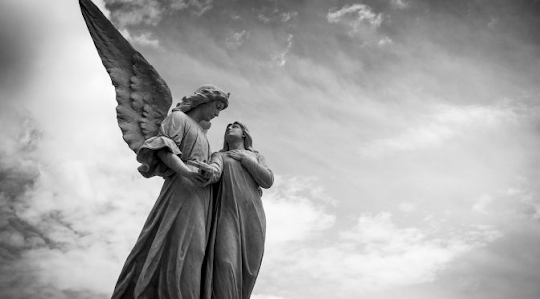
Gli angeli cantano sempre di notte
Tacciono il giorno alla luce però
Al silenzio invitano sue note.
Chi da tenebre viaggia levò
La corsa che ne porta alla fine e
Rapido e frenetico ritmo osò
Dalla notte alla luce recline
Che morta anima vive e non ascolta
Quel canto degli angeli sublime.
In Principio era il Disegno - Figure dello Spirito

In principio vi era il Disegnoche l'uomo accompagni ogni suo giornoe viva la vita sotto quel segnoperché in lui il Principio si compiadel Disegno che tutto per attornopossiede e nei giorni poi si ampiaprima che il suo fine lo ecceda.Il Principio nel Disegno vi stavaperché nel Disegno si osservava.
January 6, 2025
The Ontological Excess: Form, Structure, and Meaning
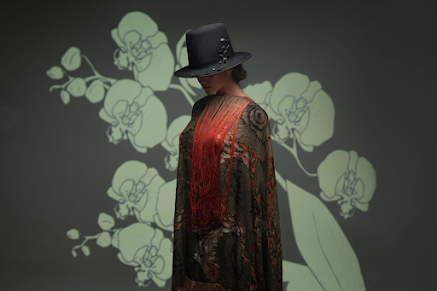 In grammar, there are rules—pre-structures that validate the use of certain linguistic forms.
In grammar, there are rules—pre-structures that validate the use of certain linguistic forms.In themselves, these rules are not, strictly speaking, structures; rather, they are what allow a structure to be a structure.
They are something that exceeds any single structure.
I recognize "Go!" as an imperative because, beyond the form I identify as imperative, there is an excess of meaning that allows me to recognize it as such. This excess of meaning does not itself have any clear signal of a definite structure.
The imperative is a structure without being a structure in the conventional sense; it opens itself to structure-formation ("Go!") and exceeds its immediate reference ("Go!").
As Wittgenstein stated:
Es ist immer von Gnaden der Natur, wenn man etwas weiß—"It is always by the grace of nature when one knows something" (Über Gewißheit, 505).
It is always through the exceeding of nature that we can understand forms.
The ontological argument, Deus est aliquid quo nihil maius cogitari potest ("God is that than which nothing greater can be conceived"), also entails this exceeding.
Both examples are invisible yet tangible and perceivable. They express that plus, the excess that grounds the ontological status of anything existent—anything that has a form to reveal itself to the world.
Natural naiveté in comparison to induced naiveté and dreaming spirits
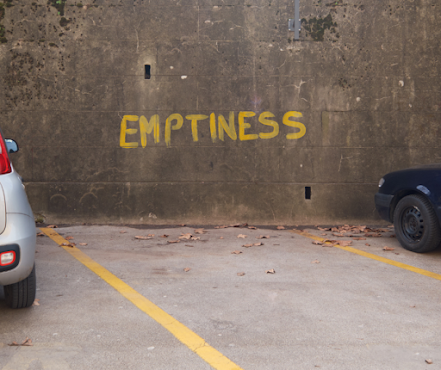
Es ist immer von Gnaden der Natur, wenn man etwas weiß"It is always by the grace of nature when one knows something."(L. Wittgenstein, Über Gewißheit, 505)
In a world where certainty is absent (Nihilism), we need hinges to ground our "certainties." These hinges enable us to accept reality as true. Some of these hinges might take the form of naiveté. Naiveté is an original disposition, rooted in instinct—something corporeal rather than intellectual or bound to rationality.
Naiveté serves as one of these hinges. Like other pivots, it is a fulcrum—a necessary reliance on "something" that prevents us from being eroded by the abyss of nothingness, which threatens to dissolve every form of communication and understanding, leaving us to collapse within the confines of the saeculum's horizon.
This is precisely the vision of Nihilism: to cancel out any possibility of communication and understanding within this horizon, excluding any form of transcendence.
One proposition of naiveté through language might be, for example, "I believe my father to be the best man in the world." Without relying on this hinge—an instinct that is natural before it becomes articulated in language—the world of my childhood would disintegrate, leaving me without any foothold (hinge) to foster growth or trust in the goodness of the world around me.I must believe that my father is the best man in the world to access the hope that the world can be reliable because there are people like my father.Meine Urteile selbst charakterisieren die Art und Weise, wie ich urteile, das Wesen des Urteilens"My judgments themselves characterize how I judge, the essence of judging."(L. Wittgenstein, Über Gewißheit, 149)
Thus, "Father as the best man in the world" and "goodness" are two hinges—two forms of naiveté—necessary for growing up and developing confidence in the world.This state of "hinging upon naiveté" also represents the condition of a "dreaming spirit."The end of this state (a dreaming spirit) is not always negative. Often, it has the positive effect of awakening dormant consciousnesses, especially when naiveté is an induced form of "hinging upon" (a perspective aligned with our rejection of philosophical neutrality, i.e. devoid of external aims, influences or biases).Kierkegaard, however, rightly observes: "Man, as spirit, must awaken [from naiveté], and he awakens through anxiety."Tension or anxiety becomes a powerful tool for bridging the gap from naiveté to creativity.An artist, a true creator, exists in this state of a dreaming spirit. Naiveté is thus positive because it does not preclude one from questioning and growing out of imposed naiveté, which is essential for creative freedom.In art, the state of a dreaming spirit forms the bedrock—a powerful pivot where foundational beliefs give rise to consequential beliefs that follow.
Here, Wittgenstein's words are apt, even if intended for a different context, as they aptly describe any fundamental bedrock:
Am Grunde des begründeten Glaubens liegt der unbegründete Glaube"At the foundation of justified belief lies unjustified belief."(L. Wittgenstein, Über Gewißheit, 253)
Wittgenstein's view here reflects a nihilism that becomes unconditional: there is nothing to believe behind what we believe. If God is dead, we need a ground capable of generating sense independently if we wish to avoid an infinite regress of nihilism.Contemporary nihilism, often bordering on Satanism, offers an extensive network of induced hinges (propaganda) designed to make us believe that "If I think p, p will follow".This phenomenon—propaganda—constitutes a series of imposed bedrocks or naiveté, or perhaps more accurately, ignorance.Yet, the end of this state of being a dreaming spirit, having relied on an induced form of naiveté, terminates any further possibility of relying on naiveté/ignorance, which, paradoxically, can also be a profound source of creativity when it is natural and not induced.
[...] aus „ich weiß p“ „p“ folgt(L. Wittgenstein, Über Gewißheit, 415)
January 5, 2025
Eccesso - Figure del male
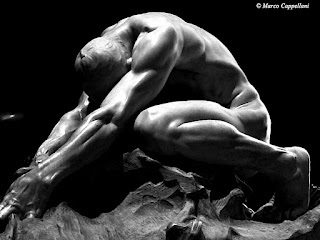
Gi incubi sono opera del demonio
Seduto in treno guardo la porta.
S' apriva, ne usciva uno e poi altro.
Gli incubi della mia vita trasporta.
Molti li conoscevo - incontrati
ne avevo. Altri non riportavo indietro.
Si allargava la porta e a tratti
Erano nuovi. Ma chi era oltre?
Dopo la porta? Mi sono alzato
Dal mio posto e oltre le torte
Anime andato e si spalancava.
Un metà uomo v'era per un lato,
Per un altro donna, che li figliava.
Le gambe aperte lorde di sangue
Le apriva che uno e altro dato
Li partoriva di suo ventre pingue.
"Tu chi sei?" Lo supplico, io perduto.
"La tua nutrice. Ti sei tu scordato?
Ora mi han preso e incompiuto
Genero i mostri di lor sortita.
Né so chi sono e metà e metà
Duro e per loro gli creo vita."
Ma era altro. Altro da me. Un eccesso
del male lontano - a me chiedeva
Il riconoscersi qui e adesso?
Io chiudevo però a lui la strada.
E lui all'infinito la tendeva
che d'una e altra parte sempre accada.
January 2, 2025
Eccesso - Figure del bene
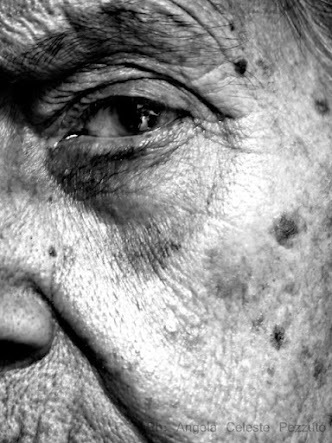 Nel corpo porto i segni del tempo.
Nel corpo porto i segni del tempo.Nell'anima quelli di uno spirito
Che s'accompagna a ogni momento
In cui vivo e declino l'infinito
Mondo che consiste nell'esser più:
Un eccesso v'è rispetto all'uso
Per cui trascendere so che posso
L'immanente che vivo di quaggiù.
Uno stare eterno vien di lassù
Come abuso che valichi l'uomo
A lui incontro s'offre, e non un suono.
In quel più trovo conferma di me
Ma non in me convalida, lui, sè.
L' eccesso
 Nel corpo porto i segni del tempo.
Nel corpo porto i segni del tempo.Nell'anima quelli di uno spirito
Che s'accompagna a ogni momento
In cui vivo e declino l'infinito
Mondo che consiste nell'esser più:
Un eccesso v'è rispetto all'uso
Per cui trascendere so che posso
L'immanente che vivo di quaggiù.
Uno stare eterno vien di lassù
Come abuso che valichi l'uomo
A lui incontro s'offre, e non un suono.
In quel più trovo conferma di me
Ma non in me convalida, lui, sè.
Nel corpo porto i segni del tempo
 Nel corpo porto i segni del tempo.
Nel corpo porto i segni del tempo.Nell'anima quelli di uno spirito
Che s'accompagna a ogni momento
In cui vivo e declino l'infinito
Mondo che consiste nell'esser più:
Un eccesso v'è rispetto all'uso
Per cui trascendere so che posso
L'immanente che vivo di quaggiù.
Uno stare eterno vien di lassù
Come abuso che valichi l'uomo
A lui incontro s'offre, e non un suono.
In quel più trovo conferma di me
Ma non in me convalida, lui, sè.
January 1, 2025
Io amo il tuo corpo

Io amo il tuo corpo,
Ne traggo nutrimento.
In me continuamente
Io ti sento e ti porto
Ché di me sia fermento.
Vibra quando si tende
Al piacere sorpreso
Di passione s'accende.
Un inno alla vita
Che per i tuoi occhi
Di blu cobalto reso
Brace s' avvita ai tocchi.
Stringo forte e annuso
Il tuo calor di donna
Che alla luce somma
Del giorno bello freme
Né tenebra poi teme.
The birth of a passion
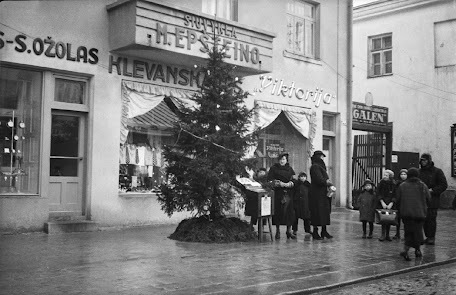
We live in times of uncertainty—of overwhelming uncertainty—where all of us, to some extent, have been forcefully driven to the end of our humanity by a boundless black hole. This black hole has a name: Nihilism. We all live as simulacra, emptied by this black hole that has seamlessly eroded our humanity.
Of course, Audrius had never had such a clear vision of it. He had never reached such pinnacles of thought in his considerations about life.
“The Spirit of Christmas,” he said in an interview with a local Catholic magazine, “has travelled through the ages carrying the same message. In times like these, it is especially important to come together with those we love.”
What he said in the interview was correct, but it was obvious. Painfully obvious.
“During the Soviet occupation of Lithuania, there was no space for Christmas celebrations. Communist ideology tried to eliminate Christmas because it was a religious holiday incompatible with the Communist vision of society. Yet our people ignored this and celebrated Christmas anyway.”
His gaze, as he spoke, was never clear. He seemed murky and shifty. At times, his countenance took on an expression that seemed shy and embarrassed. He often touched the lateral arch of his right eyebrow with his index finger.
His demeanour suggested discomfort during the interview.
And yet, he was an actor. One would expect an actor to exhibit greater ease, fluidity, and self-assurance.
“Those who had faith—those who were religious—were cautious when speaking to their children. Kids attended school or kindergarten and could unintentionally betray their families’ secrets. People lived ambiguously in those days. They acted one way, spoke another, and thought in yet another entirely.
There was a lot of uncertainty—let’s call it that. Above all, I remember you could smell a light scent of the underground among those who secretly celebrated Christmas.”
By now, Audrius had begun speaking with the intensity of a raging river. Yet his words flowed like a machine, devoid of sentiment.
"I should say that it all happened in the shadows; that would be a better term than "secret." Christmas was not celebrated in many families; yet, in mine, it was. And nothing was missing—we even had the Christmas carols".
He said this with a dreamy look that, seconds later, shifted to a lifeless gaze.
The interviewer could not help but notice the dead look he took on; weirdly, she realized it matched the jacket he wore—a brown checkered jacket over a brown cycling sweater. He lacked amor sui. Definitely.
When I was a boy, I sang in the 'Ąžuoliukas' choir, which, despite existing during Soviet times, performed a surprising amount of religious music. The choir organized concerts and recordings in Vilnius Cathedral, a building the Soviets had repurposed into an art gallery.
One day, one of the choir leaders spoke to us openly and without fear about the religious context of the songs we performed. We sang Handel’s works, and he began explaining the Old Testament. All those stories were fascinating. For us, as young boys, it was genuinely enjoyable to listen.
At that moment, the interviewer asked Audrius whether this experience might have inspired his later interest in public poetry readings. Could there be a connection between his fascination with music, art, and the Old Testament, and his love for poetry?
"Interesting question," he replied. "Interesting...I've never thought of it...I cannot dismiss the possibility. I’m not certain, but I cannot exclude it either".

